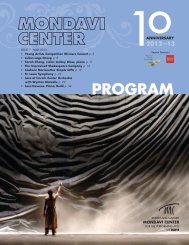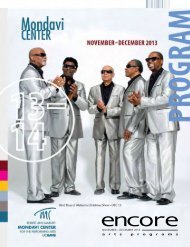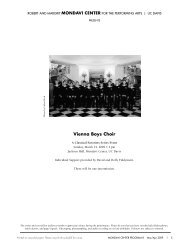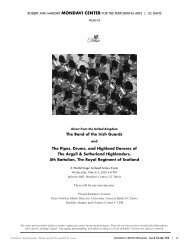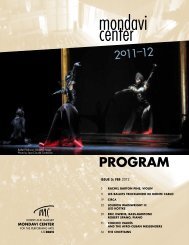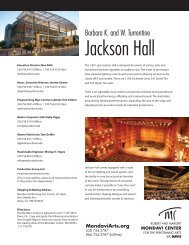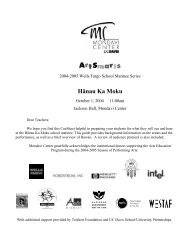A <strong>Mondavi</strong> <strong>Center</strong> Just Added Event Sunday, November 4, 2012 • 7PM Jackson Hall, <strong>Mondavi</strong> <strong>Center</strong>, UC Davis 20 | <strong>Mondavi</strong> <strong>Center</strong> Presents Program issue 3: nov 2012 b.b. kinG B.B. King, since he started recording in the late 1940s, has released more than 60 albums many of them considered blues classics, like the definitive live blues album Live At The Regal (1965) and collaboration with Bobby “Blue” Bland, Together For The First Time (1976). Over the years, King has had two number one R & B hits, “Three O’Clock Blues” (1951) and “You Don’t Know Me” (1952) and four number two R & B hits, “Please Love Me” (1953) and “You Upset Me Baby” (1954), “Sweet Sixteen, Part I” (1960) and “Don’t Answer The Door, Part I” (1966). King’s most popular crossover hit, “The Thrill Is Gone” (1970), went to number 15 pop. But King, as well as the entire blues genre, is not radio oriented. His classic songs such as “Payin The Cost To Be the Boss,” “Caldonia,” “How Blue Can You Get,” “Everyday I Have the Blues” and “Why I Sing the Blues” are concert (and fan) staples. King was born Riley B. King on September 16, 1925, on a cotton plantation in Itta Bene, Mississippi, just outside the Mississippi Delta town of Indianola. He used to play on the corner of Church and Second Street for dimes and would sometimes play in as many as four towns on a Saturday night. With his guitar and $2.50, he hitchhiked north to Memphis in 1947 to pursue his musical career. Memphis was the city to which every important musician of the South gravitated and which supported a large, competitive musical community, where virtually every black musical style was heard. King stayed with his cousin Bukka White, one of the most renowned rural blues performers of his time, who schooled King further in the art of the blues. Program is subject to change. The artists and your fellow audience members appreciate silence during the performance. Please be sure that you have switched off all electronic devices. Videotaping, photographing and audio recording are strictly forbidden. Violators are subject to removal.
King’s first big break came in 1948, when he performed on Sonny Boy Williamson’s radio program on KWEM out of West Memphis. This led to steady performance engagements at the Sixteenth Avenue Grill in West Memphis and later to a 10 minute spot on black staffed and managed radio station WDIA. King’s Spot, sponsored by Pepticon, a health tonic, became so popular that it was increased in length and became the Sepia Swing Club. Soon, King needed a catchy radio name. What started out as Beale Street Blues Boy was shortened to Blues Boy King, and eventually B.B. King. Incidentally, King’s middle initial “B” is just that; it is not an abbreviation. In the mid-1950s, while King was performing at a dance in Twist, Arkansas, a few fans became unruly. Two men got into a fight and knocked over a kerosene stove, setting fire to the hall. King raced outdoors to safety with everyone else, but then realized that he left his $30 guitar inside, so he rushed back inside to retrieve it, narrowly escaping death. When he later found out that the fight had been over a woman named Lucille, he decided to give the name to his guitar. Each one of King’s guitars since that time has been called Lucille. Soon after his number one hit, “Three O’Clock Blues,” King began touring nationally, and he has never stopped, performing an average of 125 concerts a year. In 1956, King and his band played an astonishing 342 one-night stands. From the chitlin circuit with its small town cafes, ghetto theaters, country dance halls and roadside joints to jazz clubs, rock palaces, symphony concert halls, college concerts, resort hotels and prestigious concert halls nationally and internationally, King has become the most renowned blues musician of the past 60 years. King’s technique is nonetheless complex, featuring delicate filigrees of single string runs punctuated by loud chords, subtle vibratos, and “bent” notes. The technique of rock guitar playing is to a large degree derived from King’s playing. Over the years, King has developed one of the world’s most readily identified guitar styles. He borrowed from Lonnie Johnson, Blind Lemon Jefferson, T-Bone Walker and others integrating his precise vocal-like string bends and his left hand vibrato, both of which have become indispensable components of rock guitarist vocabulary. His economy, his every-note-counts phrasing, has been a model for thousands of players including Eric Clapton, George Harrison and Jeff Beck. King has mixed traditional blues, jazz, swing, mainstream pop and jump into a unique sound. His singing is richly melodic, both vocally and in the “singing” that comes from his guitar. In King’s words, “When I sing, I play in my mind; the minute I stop singing orally, I start to sing by playing Lucille. “I’m trying to get people to see that we are our brother’s keeper, I still work on it. Red, white, black, brown, yellow, rich, poor, we all have the blues. “From my own experience, I would say to all people but maybe to young people especially black, white or whatever color, follow your own feelings and trust them; find out what you want to do, and do it and then practice it every day of your life and keep becoming what you are despite any hardships and obstacles you meet.” “I’m me,” King told Time magazine in 1969. “Blues is what I do best. If Frank Sinatra can be the best in his field, Nat King Cole in his, Bach and Beethoven in theirs, why can’t I be great and known for it, in blues?” King has influenced Eric Clapton, Mike Bloomfield, Albert Collins, Buddy Guy, Freddie King, Jimi Hendrix, Otis Rush, Johnny Winter, Albert King and many others while being influenced by Charles Brown, Lowell Fulsom, Elmore James, Blind Lemon Jefferson, Jimmy Rushing, T-Bone Walker, Bukka White and others. In 1969, B.B. was chosen by the Rolling Stones to open 18 American concerts for them; Ike and Tina Turner also played on 18 shows. King also made the first of his numerous appearances on Johnny Carson’s The Tonight Show. In 1970, King premiered in Las Vegas at Caesar’s Palace and at the Royal Box in the American Hotel in New York City as well as on The Ed Sullivan Show. In the early 1970s, B.B. toured Ghana, Lagos, Chad and Liberia under the auspices of the United States State Department, besides playing the major jazz festivals around the world. King was inducted into the Blues Foundation Hall of Fame in 1984 and into the Rock and Roll Hall of Fame in 1987, where Sting of the Police made the induction speech. King was the recipient of the 1986 National Association for Campus Activities Hall of Fame Award. King was Blues Act of the Year in 1985, 1987 and 1988 Performance Award Polls. He is a founding member of the John F. Kennedy Performing Arts <strong>Center</strong>. King received the Grammy “Lifetime Achievement Award” in 1987. He won the Lifetime Achievement Award from the Blues Foundation in 1997. King has received four honorary doctorates: Tougaloo (Mississippi) College (L.H.D.) in 1973; Yale University (D. Music) in 1977; Berklee College of Music (D. Music) in 1982 and Rhodes College of Memphis (D. Fine Arts) in 1990. In 1992, he received the National Award of Distinction from the University of Mississippi. On May 3, 1991, “B.B. King’s Blues Club” opened in Memphis and also at the Universal City Walk in Los Angeles in 1994, and although King resides in Las Vegas, he plans to play at his clubs at least four times a year. A B.B. King Blues Club opened in New York’s Times Square’s E-Walk in early 2000. In 1996, the CD-ROM On The Road With B.B. King: An Interactive Autobiography was released to rave reviews including an “A-” in Entertainment Weekly. Also in 1996, King’s autobiography Blues All Around Me (written with David Ritz) was published and won second prize in the prestigious Eighth Annual Ralph J. Gleason Music Book Awards. The biography The Arrival of B.B. King by Charles Sawyer was published in 1980 by Doubleday. In 1997, MCA released King’s album Deuces Wild with King in tandem with 13 legendary artists. The lineup included Eric Clapton, the Rolling Stones, Bonnie Raitt, Willie Nelson, Joe Cocker, Tracy Chapman, Mick Hucknall (Simply Red), Dr. John, Marty Stuart, D’Angelo, David Gilmore & Paul Carrick and Heavy D. Deuces Wild became King’s second gold album. In 1999, B.B. King released Let the Good Times Roll, his tribute to Louis Jordan. “Louis Jordan was a great musician,” says King, “and in my opinion, was way ahead of his time. As people get to know him, they will realize what a great contribution he left to the music of today.” <strong>Mondavi</strong>Arts.org | 21
- Page 1 and 2: Issue 3: nov 2012 shakespeare’s g
- Page 3 and 4: AnnIversAry 2012—13 season sponso
- Page 5 and 6: Photo: Lynn Goldsmith RObeRt aNd Ma
- Page 7 and 8: cAst lIst Michael Benz, Hamlet Pete
- Page 9 and 10: You Like It (AFTLS U.S. tour); Blit
- Page 11 and 12: Christopher Saul (Polonius / Franci
- Page 13 and 14: A Crossings Series Event Saturday,
- Page 15 and 16: ETHEL has initiated innovative coll
- Page 17 and 18: A Debut Series Event Sunday, Novemb
- Page 19 and 20: committee to relieve him of his pos
- Page 21: Stephen waarts, age 16, started his
- Page 25 and 26: Photo by Randi Beach A Western Heal
- Page 27 and 28: Symphony No. 4 in B flat-Major, Op.
- Page 29 and 30: VIOLIN Katherine Kyme, concertmaste
- Page 31 and 32: ProgrAm gloria (World Premiere: Oct
- Page 33 and 34: About dance theatre of harlem Dance
- Page 35 and 36: Jenelle Figgins (dancer) began her
- Page 37 and 38: Stephanie Williams (dancer) was bor
- Page 39 and 40: A Wells Fargo Concert Series Event
- Page 41 and 42: program notes Rondo for Violin and
- Page 43 and 44: sam haywood (piano), a British pian
- Page 45 and 46: Ballet folklórico de méxico de am
- Page 47 and 48: Jalisco The state of Jalisco is the
- Page 49 and 50: A Just Added Event Friday, November
- Page 51 and 52: jojga hip hop foundation samples po
- Page 53 and 54: ProgrAm notes I grew up in the nort
- Page 55 and 56: DireCtors CirCle $1,250- $3,249 Ezr
- Page 57 and 58: globe education Academy for teacher
- Page 59: We’ve lifted health care to an ar



